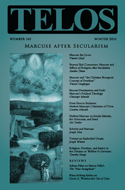Joseph Diaz’s “Schmitt and Marcuse: Friends, Force, and Quality” appears in Telos 165 (Winter 2013). Read the full version online at the Telos Online website, or purchase a print copy of the issue in our store.
 This article aims at exploring the potential for a politically operative theory of opposition to liberalism’s stultifying politics of process. Given their formal political positionality as critics of liberal neutrality, as well as their historically particular relationship to some of the most volatile politics of the twentieth century, Marcuse and Schmitt cannot but be brought into discourse with one another in the most pressing of times, for three reasons. First, by exploring the modalities of their respective criticisms, this article locates an enemy common to both thinkers in the neutralization of the political through the attempted elimination of the decision. Second, in using Schmitt’s framework of the friend-enemy distinction, further investigation into the potential complicities between anti-liberal thought illuminates the limitations of founding political friendship on mere enemy identification alone. This point leads into the third and final major theme of the article, which explains the relationship of politically directive content to the formal moment of decision. From Schmitt, we learn the formal moment of re-claiming the political through stipulating the decision to be political is necessary for overcoming totalitarian neutralization. And from Marcuse, we learn the necessity of political discrimination developed precisely through careful attention to the horizons of formal decisionism. In order to extract maximal political meaning from both thinkers in their anti-anti-politics, they must be considered in a wider and deeper, formally political, dialectic, one situated at the intersection of the political, theological, and ontological coordinates of existence.
This article aims at exploring the potential for a politically operative theory of opposition to liberalism’s stultifying politics of process. Given their formal political positionality as critics of liberal neutrality, as well as their historically particular relationship to some of the most volatile politics of the twentieth century, Marcuse and Schmitt cannot but be brought into discourse with one another in the most pressing of times, for three reasons. First, by exploring the modalities of their respective criticisms, this article locates an enemy common to both thinkers in the neutralization of the political through the attempted elimination of the decision. Second, in using Schmitt’s framework of the friend-enemy distinction, further investigation into the potential complicities between anti-liberal thought illuminates the limitations of founding political friendship on mere enemy identification alone. This point leads into the third and final major theme of the article, which explains the relationship of politically directive content to the formal moment of decision. From Schmitt, we learn the formal moment of re-claiming the political through stipulating the decision to be political is necessary for overcoming totalitarian neutralization. And from Marcuse, we learn the necessity of political discrimination developed precisely through careful attention to the horizons of formal decisionism. In order to extract maximal political meaning from both thinkers in their anti-anti-politics, they must be considered in a wider and deeper, formally political, dialectic, one situated at the intersection of the political, theological, and ontological coordinates of existence.








